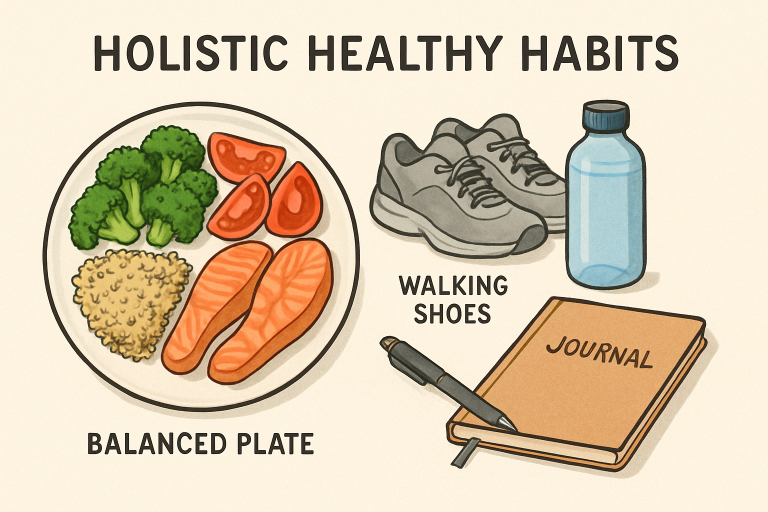Table of Contents
- 1 Why Quick Fixes Rarely Work
- 2 Building a Holistic Approach to Weight Loss
- 3 Personalization Matters: Nutrition and Activity
- 4 Understanding Nutrition Beyond Calorie Count
- 5 Exercise and Non-Scale Victories
- 6 Mental Health and Its Influence on Weight Management
- 7 Community Support and Accountability for Lasting Results
- 8 Staying Consistent and Motivated Over Time
Why Quick Fixes Rarely Work
It’s easy to be drawn to dramatic solutions when it comes to shedding pounds. Promises of rapid weight loss from fad diets and extreme routines are everywhere. Yet science consistently tells a different story: most quick-fix approaches are unsustainable and can undermine health in the long term. Approaches such as weight loss injections Richmond, VA, can play a role within a holistic, medically supervised plan, but true, lasting change always comes down to building a foundation of healthy habits, not relying on shortcuts.
Rapid weight loss often leads to muscle loss, nutrient depletion, and a metabolic slowdown—all of which make it harder to maintain weight loss. Typically, these methods don’t address the complex factors that influence weight, including genetics, hormones, sleep, stress, and other lifestyle elements. The resulting cycle of yo-yo dieting can leave people feeling frustrated and discouraged.
Building a Holistic Approach to Weight Loss
Sustainable weight loss isn’t about punishing yourself or following a one-size-fits-all plan. Instead, successful transformation is rooted in a holistic approach—one that balances nutrition, activity, sleep quality, stress reduction, and self-compassion. Small, daily changes tend to stick more effectively than sweeping overhauls. Tools such as journaling your meals, preparing food in advance, and practicing mindful eating are widely recommended as effective strategies for building healthier routines.
All of these pillars—nutrition, movement, sleep, and mindset—work in harmony to support overall well-being. If just one is neglected, progress is often slow or inconsistent. Experts suggest starting with manageable goals, such as drinking more water, walking after meals, preparing more home-cooked dishes, or setting a consistent bedtime. Over time, these shifts compound and lead to significant improvements.

Personalization Matters: Nutrition and Activity
No two people have the same genetics, environment, or preferences. This is why customized approaches always outperform generic programs. Some individuals thrive on plant-based meals, while others respond best to Mediterranean or high-protein plans. Understanding your body’s needs—and what keeps you satisfied and energized—makes a huge difference in both motivation and results. Consulting with a registered dietitian or certified personal trainer can provide a roadmap tailored to your unique starting point and goals.
Personalization also extends to physical activity. Enjoying your exercise routine is the strongest indicator that you’ll sustain it. Whether that means brisk walks, yoga, swimming, or weightlifting, finding physical activities you look forward to will simplify consistency. The CDC’s physical activity guidelines recommend 150 minutes of moderate movement each week for most adults, but the most successful routines are the ones you genuinely enjoy. Adding variety to your workouts can prevent boredom and plateaus. Setting realistic, incremental goals can also help you stay motivated over time. Remember, consistency is key, and making your fitness routine enjoyable increases the likelihood of long-term success.
Understanding Nutrition Beyond Calorie Count
Calories do matter for weight management, but focusing solely on the numbers can overlook the importance of food quality. Choosing nutrient-dense foods, such as vegetables, fruits, lean proteins, and whole grains, provides the body with essential vitamins and minerals, promotes satiety, and helps regulate energy levels. Meals rich in protein and fiber can keep you fuller for longer, supporting better food choices throughout the day. The CDC’s healthy eating guidelines emphasize the value of variety, highlighting colorful produce, healthy fats, and nutrient-rich staples as the foundation of any eating pattern designed for lasting success.
Exercise and Non-Scale Victories
Physical movement is crucial—not just for burning extra calories, but also for supporting emotional well-being, building strength, and preserving muscle during weight loss. The number on the scale is only a small part of the overall picture; improvements in energy, mood, sleep, and strength often come well before major shifts in weight. It’s essential to acknowledge and appreciate these non-scale victories, whether that’s running an extra minute, feeling more at ease in your clothes, or achieving new personal milestones in the gym.
Mental Health and Its Influence on Weight Management
Emotional health and weight are deeply connected. High stress, chronic anxiety, or depression can interfere with the body’s hunger signals and fuel cycles of emotional eating or insomnia. Incorporating mindfulness techniques—such as meditation, deep breathing, or journaling—can help reduce stress and support healthier behaviors. For those struggling with emotional or binge eating, professional support from a therapist or counselor can be invaluable.
Community Support and Accountability for Lasting Results
Being part of a supportive community—be it friends, family, online groups, or a coach—dramatically boosts motivation and resilience when challenges arise. Accountability partners encourage you through tough days and celebrate your achievements, turning individual progress into collective success. Whether you join a walking club, participate in a virtual group, or simply share your goals with a friend, having people in your corner increases the chances of staying on track and enjoying the journey.
Staying Consistent and Motivated Over Time
Lasting weight loss is not about perfection, but about showing up for yourself, even on imperfect days. Setbacks are an expected part of the process. Instead of seeing them as failures, view them as learning opportunities. Tracking progress, setting small and realistic goals, and finding meaningful ways to celebrate your efforts—such as buying new workout gear after a milestone—nurtures both persistence and self-worth. Ultimately, embracing science-based strategies that help you build sustainable rhythms and lifestyle changes is key. Focus on what matters most: self-compassion, minor improvements, and continuous learning. Over time, these habits can transform your well-being and help you achieve lasting goals.
